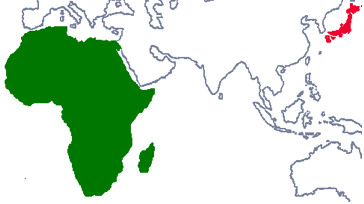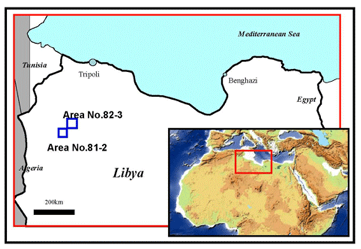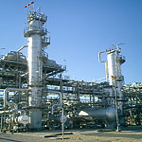Japan and China Race for African Oil
By Hisane MASAKI
The increasingly fierce competition between Japan and China over energy and political influence is spilling over into Africa.
Following in the footsteps of Beijing, Tokyo has recently begun to turn to the continent as a new source of oil. Meanwhile, the leaders of the two Asian neighbors have recently made whirlwind tours of Africa.

Japan/Africa
While Japan until recently has almost ignored Africa as an energy-resource supplier, China has been aggressively pursuing oil and gas interests in Africa. Japan and China are the world's No 3 and No 2 oil consumers, respectively. And they are both hungry for energy
to feed their economies, the world's No 2 and No 4, respectively, in terms of gross domestic product.
Japan imports almost all of its oil, nearly 90% of which comes
from the Middle East. Deeply concerned about energy security at a time of stubbornly high global oil prices and a global rush for oil and other energy resources, Japan's Ministry of Economy, Trade and Industry (METI) recently released a new long-terms strategy aimed at ensuring stable oil, gas and other energy-resource supplies.
The New National Energy Strategy calls for, among other things, strengthening relations with resource-rich countries, securing energy resources abroad through the fostering of more powerful domestic energy companies, and boosting to 40% by 2030 from the current 15% the ratio of "Hinomaru oil", that is oil developed and imported through Japanese domestic producers.
METI chief Nikai Toshihiro announced recently that Japan will send a high-powered mission, including the head of the METI-affiliated Agency for Natural Resources and Energy, to Libya to strengthen bilateral ties in energy and other areas. Libya, with an estimated 39 billion barrels of oil, has the world's ninth-largest reserves.
Last October, Japan scored a coup in its oil diplomacy. Five Japanese enterprises won international tenders to acquire the rights to develop a combined six oil blocks in Libya. The deals marked the first oil-exploration concession ever given to Japanese firms in Libya.

Two Japanese oil blocks in Libya
Japan is also eyeing interests in oilfields in the rest of Africa. The government sent a fact-finding mission of officials from oil developers, trading firms and engineering firms to Mauritania and Chad early this year. Mauritanian Petroleum and Energy Minister Mohamed Aly visited Tokyo recently and met with Nikai. The two ministers agreed to cooperate in developing oil resources in the northwestern African country. Nikai pledged to send a high-level private-public mission to Mauritania soon, led by the head of the Agency for Natural Resources and Energy.
Japan also views as promising the development of oilfields in other African countries such as Equatorial Guinea and Ivory Coast.
While Japan has largely ignored Africa as a source of its badly needed oil, not all Japanese oil developers have shied away from making forays there. AOC, for example, signed a production-sharing contract with Egypt in July 2005 for oil and gas exploration and development in the Northwest October block in the Gulf of Suez. AOC plans to start production there during fiscal 2008. Teikoku Oil is more active in Egypt. It was awarded two blocks through an international tender in June 2005 - the South October and North Qarun blocks.
Earlier, Teikoku Oil had acquired interests in the West Bakr and Southeast July blocks. Teikoku Oil also made inroads into the Algerian oil and gas sectors several years ago. It is participating in development projects in Ohanet and El Ouar I and II blocks. Teikoku Oil has also participated in an offshore oil development project in the Democratic Republic of Congo since the 1970s.

Teikoku Oil’s gas project in Algeria
Japan's new focus on Africa as a source of energy resources, especially oil, comes on the heels of China's aggressive forays into the continent's energy sector, as exemplified by recent visits by President Hu Jintao and Premier Wen Jiabao. Hu visited three African countries, including Nigeria, the continent's largest oil producer. Wen visited seven countries, including Angola, the continent's second-largest oil producer.
China is a leading player in the recent global rush for oil and other energy reserves. China now depends on imports for more than 40% of its oil. The International Energy Agency predicts this will rise to 75% in 2030. Competition for energy sources has increased tensions between China and Japan. The Asian neighbors are locked in a simmering fracas over Chinese gas projects in the disputed waters in the East China Sea. They have also lobbied hard for alternative routes for a pipeline from eastern Siberia's oilfields to Pacific Rim nations.
China's aggressiveness in the global oil market drew widespread attention last summer when China National Offshore Oil Corp’s takeover bid for US oil-and-gas firm Unocal was blocked by the US government.
Still, China has gotten its hands on many foreign oil deposits in the past year or two, including some in Africa. China won oil interests off the coast of Angola after wooing that African country with a US$2 billion credit line. China also made the $2.27 billion purchase of a 45% stake in the Akpo offshore oil-and-gas field in Nigeria. China secured four oil-drilling licenses from Nigeria during Hu's African tour. The ratio of crude-oil imports from Africa to China's overall imports of the fuel has reached 30%. China's focus is on Nigeria, Angola and Sudan. It is possible that Angola has already replaced Saudi Arabia as China's largest oil supplier.
To be sure, Japan has also stepped up its Africa diplomacy in recent years. But this has been driven mainly by a strong desire to gain support from the continent's 53 countries for Japan's bid for a permanent United Nations Security Council seat.
Meanwhile, in late April Japanese Prime Minister Koizumi Junichiro visited Ethiopia, where the African Union is headquartered. Japan has hosted the ministerial-level Tokyo International Conference on African Development three times since 1993 to muster international support for the region, still plagued by poverty, conflict and infectious diseases. Japan will host the fourth TICAD in 2008. Japan, the world's second-largest donor of official development assistance (ODA) after the United States, has chipped in about 10% of such money extended directly to developing countries. At the Asian-African summit in Jakarta in April last year, Koizumi announced a decision to double Japanese ODA for Africa in three years.
However, China seems to be outdoing Japan in forging closer economic relations - and increasing influence - with Africa. African-Chinese trade totaled $40 billion in 2005, up 35% from 2004. This figure eclipses African-Japanese trade, which totaled $18 billion in 2005. In addition, China's investment in Africa is rising sharply, and Beijing boasts a proactive record on aid and debt relief, having given more than $5.5 billion in assistance and canceled the debt of 31 countries.
China does not seem to be fussy about where its oil comes from. It gets oil in Sudan, for example, despite the international uproar over the Darfur crisis. To be sure, Japan won concession rights for oil and gas in Sudan in June last year. But the winner, Systems International Group, is a company newly established by a Japanese non-governmental organization, Reliance. It plans to use the profit from oil development in eastern Sudan to finance humanitarian support in Africa.
China's appetite for oil and other resources is not the only reason for Beijing's active charm diplomacy in Africa.
Taiwan announced early this month that it was breaking off diplomatic relations with Chad, just hours before a planned trip by Taiwanese Premier Su Tseng-chang to the Central African country. Su's trip was canceled. A Taiwanese spokesman said Chad was under pressure from Beijing to end its relations with Taiwan, so the island's leaders made the break before Chad could move on its own.
At first glance, many African countries seem to be benefiting from China's runaway economic growth. Critics say that Beijing's interest in Africa is driven by self-interest and that it is prepared to ignore political, environmental and humanitarian considerations in its search for energy resources. They also say that oil wealth could entrench corruption in countries while natural resources are controlled by small elites.
Unlike China, Japan, the self-proclaimed champion of democracy in Asia, cannot turn a blind eye to poor records on democracy and human rights in many African countries. Japan has applied strict criteria for aid provision to developing countries in Asia, Africa and elsewhere in the world, with democracy and human-rights protection as basic conditions.
China's influence in Africa looks set to grow further. The emerging economic powerhouse seems to be seen by some African leaders as a role model for their own nations. The odds seem to be in China's favor.
Hisane Masaki is a Tokyo-based journalist, commentator and scholar on international politics and economy. Masaki's e-mail address is yiu45535@nifty.com. This is a slightly abbreviated version of an article that appeared in Asia Times. Posted at Japan Focus on August 19, 2006.
The increasingly fierce competition between Japan and China over energy and political influence is spilling over into Africa.
Following in the footsteps of Beijing, Tokyo has recently begun to turn to the continent as a new source of oil. Meanwhile, the leaders of the two Asian neighbors have recently made whirlwind tours of Africa.

Japan/Africa
While Japan until recently has almost ignored Africa as an energy-resource supplier, China has been aggressively pursuing oil and gas interests in Africa. Japan and China are the world's No 3 and No 2 oil consumers, respectively. And they are both hungry for energy
to feed their economies, the world's No 2 and No 4, respectively, in terms of gross domestic product.
Japan imports almost all of its oil, nearly 90% of which comes
from the Middle East. Deeply concerned about energy security at a time of stubbornly high global oil prices and a global rush for oil and other energy resources, Japan's Ministry of Economy, Trade and Industry (METI) recently released a new long-terms strategy aimed at ensuring stable oil, gas and other energy-resource supplies.
The New National Energy Strategy calls for, among other things, strengthening relations with resource-rich countries, securing energy resources abroad through the fostering of more powerful domestic energy companies, and boosting to 40% by 2030 from the current 15% the ratio of "Hinomaru oil", that is oil developed and imported through Japanese domestic producers.
METI chief Nikai Toshihiro announced recently that Japan will send a high-powered mission, including the head of the METI-affiliated Agency for Natural Resources and Energy, to Libya to strengthen bilateral ties in energy and other areas. Libya, with an estimated 39 billion barrels of oil, has the world's ninth-largest reserves.
Last October, Japan scored a coup in its oil diplomacy. Five Japanese enterprises won international tenders to acquire the rights to develop a combined six oil blocks in Libya. The deals marked the first oil-exploration concession ever given to Japanese firms in Libya.

Two Japanese oil blocks in Libya
Japan is also eyeing interests in oilfields in the rest of Africa. The government sent a fact-finding mission of officials from oil developers, trading firms and engineering firms to Mauritania and Chad early this year. Mauritanian Petroleum and Energy Minister Mohamed Aly visited Tokyo recently and met with Nikai. The two ministers agreed to cooperate in developing oil resources in the northwestern African country. Nikai pledged to send a high-level private-public mission to Mauritania soon, led by the head of the Agency for Natural Resources and Energy.
Japan also views as promising the development of oilfields in other African countries such as Equatorial Guinea and Ivory Coast.
While Japan has largely ignored Africa as a source of its badly needed oil, not all Japanese oil developers have shied away from making forays there. AOC, for example, signed a production-sharing contract with Egypt in July 2005 for oil and gas exploration and development in the Northwest October block in the Gulf of Suez. AOC plans to start production there during fiscal 2008. Teikoku Oil is more active in Egypt. It was awarded two blocks through an international tender in June 2005 - the South October and North Qarun blocks.
Earlier, Teikoku Oil had acquired interests in the West Bakr and Southeast July blocks. Teikoku Oil also made inroads into the Algerian oil and gas sectors several years ago. It is participating in development projects in Ohanet and El Ouar I and II blocks. Teikoku Oil has also participated in an offshore oil development project in the Democratic Republic of Congo since the 1970s.

Teikoku Oil’s gas project in Algeria
Japan's new focus on Africa as a source of energy resources, especially oil, comes on the heels of China's aggressive forays into the continent's energy sector, as exemplified by recent visits by President Hu Jintao and Premier Wen Jiabao. Hu visited three African countries, including Nigeria, the continent's largest oil producer. Wen visited seven countries, including Angola, the continent's second-largest oil producer.
China is a leading player in the recent global rush for oil and other energy reserves. China now depends on imports for more than 40% of its oil. The International Energy Agency predicts this will rise to 75% in 2030. Competition for energy sources has increased tensions between China and Japan. The Asian neighbors are locked in a simmering fracas over Chinese gas projects in the disputed waters in the East China Sea. They have also lobbied hard for alternative routes for a pipeline from eastern Siberia's oilfields to Pacific Rim nations.
China's aggressiveness in the global oil market drew widespread attention last summer when China National Offshore Oil Corp’s takeover bid for US oil-and-gas firm Unocal was blocked by the US government.
Still, China has gotten its hands on many foreign oil deposits in the past year or two, including some in Africa. China won oil interests off the coast of Angola after wooing that African country with a US$2 billion credit line. China also made the $2.27 billion purchase of a 45% stake in the Akpo offshore oil-and-gas field in Nigeria. China secured four oil-drilling licenses from Nigeria during Hu's African tour. The ratio of crude-oil imports from Africa to China's overall imports of the fuel has reached 30%. China's focus is on Nigeria, Angola and Sudan. It is possible that Angola has already replaced Saudi Arabia as China's largest oil supplier.
To be sure, Japan has also stepped up its Africa diplomacy in recent years. But this has been driven mainly by a strong desire to gain support from the continent's 53 countries for Japan's bid for a permanent United Nations Security Council seat.
Meanwhile, in late April Japanese Prime Minister Koizumi Junichiro visited Ethiopia, where the African Union is headquartered. Japan has hosted the ministerial-level Tokyo International Conference on African Development three times since 1993 to muster international support for the region, still plagued by poverty, conflict and infectious diseases. Japan will host the fourth TICAD in 2008. Japan, the world's second-largest donor of official development assistance (ODA) after the United States, has chipped in about 10% of such money extended directly to developing countries. At the Asian-African summit in Jakarta in April last year, Koizumi announced a decision to double Japanese ODA for Africa in three years.
However, China seems to be outdoing Japan in forging closer economic relations - and increasing influence - with Africa. African-Chinese trade totaled $40 billion in 2005, up 35% from 2004. This figure eclipses African-Japanese trade, which totaled $18 billion in 2005. In addition, China's investment in Africa is rising sharply, and Beijing boasts a proactive record on aid and debt relief, having given more than $5.5 billion in assistance and canceled the debt of 31 countries.
China does not seem to be fussy about where its oil comes from. It gets oil in Sudan, for example, despite the international uproar over the Darfur crisis. To be sure, Japan won concession rights for oil and gas in Sudan in June last year. But the winner, Systems International Group, is a company newly established by a Japanese non-governmental organization, Reliance. It plans to use the profit from oil development in eastern Sudan to finance humanitarian support in Africa.
China's appetite for oil and other resources is not the only reason for Beijing's active charm diplomacy in Africa.
Taiwan announced early this month that it was breaking off diplomatic relations with Chad, just hours before a planned trip by Taiwanese Premier Su Tseng-chang to the Central African country. Su's trip was canceled. A Taiwanese spokesman said Chad was under pressure from Beijing to end its relations with Taiwan, so the island's leaders made the break before Chad could move on its own.
At first glance, many African countries seem to be benefiting from China's runaway economic growth. Critics say that Beijing's interest in Africa is driven by self-interest and that it is prepared to ignore political, environmental and humanitarian considerations in its search for energy resources. They also say that oil wealth could entrench corruption in countries while natural resources are controlled by small elites.
Unlike China, Japan, the self-proclaimed champion of democracy in Asia, cannot turn a blind eye to poor records on democracy and human rights in many African countries. Japan has applied strict criteria for aid provision to developing countries in Asia, Africa and elsewhere in the world, with democracy and human-rights protection as basic conditions.
China's influence in Africa looks set to grow further. The emerging economic powerhouse seems to be seen by some African leaders as a role model for their own nations. The odds seem to be in China's favor.
Hisane Masaki is a Tokyo-based journalist, commentator and scholar on international politics and economy. Masaki's e-mail address is yiu45535@nifty.com. This is a slightly abbreviated version of an article that appeared in Asia Times. Posted at Japan Focus on August 19, 2006.